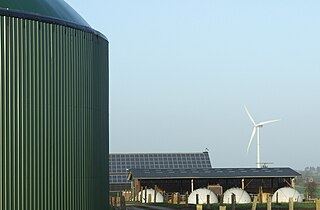
Renewable energy in Germany is mainly based on wind and biomass, plus solar and hydro. Germany had the world's largest photovoltaic installed capacity until 2014, and as of 2023 it has over 82 GW. It is also the world's third country by installed total wind power capacity, 64 GW in 2021 and second for offshore wind, with over 7 GW. Germany has been called "the world's first major renewable energy economy".

Solar power accounted for an estimated 12.2% of electricity production in Germany in 2023, up from 1.9% in 2010 and less than 0.1% in 2000.
Feed-in electricity tariffs (FiT) were introduced in Germany to encourage the use of new energy technologies such as wind power, biomass, hydropower, geothermal power and solar photovoltaics. Feed-in tariffs are a policy mechanism designed to accelerate investment in renewable energy technologies by providing them remuneration above the retail or wholesale rates of electricity. The mechanism provides long-term security to renewable energy producers, typically based on the cost of generation of each technology. Technologies such as wind power, for instance, are awarded a lower per-kWh price, while technologies such as solar PV and tidal power are offered a higher price, reflecting higher costs.
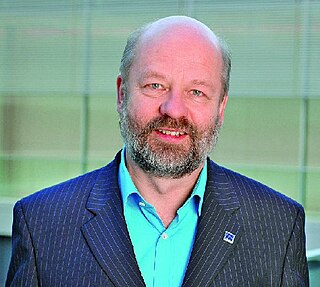
Hans-Josef Fell is a German former politician who was a member of the German Bundestag from 1998 to 2013. A member of Alliance 90/The Greens, he co-authored the 2000 draft of the Renewable Energy Sources Act alongside Hermann Scheer, establishing the foundation for the technology developments in photovoltaic, biogas, wind power and geothermal energy in Germany. Fell is founder and president of the Energy Watch Group and an internationally renowned energy and climate change advisor, author and speaker.
Preben Maegaard, was a Danish renewable energy pioneer, author and expert. Since the oil crisis in 1974 he worked for the transition from fossil fuels to renewable energy. Preben Maegaard was co-founder of the Nordic Folkecenter for Renewable Energy, established in 1983, and its director 1984 till 2013 (www.folkecenter.net).

Energy in Germany is obtained for the vast majority from fossil sources, accounting for 77.6% of total energy consumption in 2023, followed by renewables at 19.6%, and 0.7% nuclear power. As of 2023, German primary energy consumption amounted to 10,791 Petajoule, making it the ninth largest global primary energy consumer. The total consumption has been steadily declining from its peak of 14,845 Petajoule in 2006. In 2023 Germany's gross electricity production reached 508.1 TWh, down from 569.2 TWh in 2022, and 631.4 TWh in 2013.
Martin Vosseler was a Swiss renewable energy advocate, co-founder of the organization Physicians for Social Responsibility, who has been a renewable energy advocate since 1981. After giving up his medical practice in 1995, he began working full-time to raise awareness of the benefits of renewable energy use, by traveling around the world. From 16 October 2006 to 8 May 2007, Vosseler and his crew made history by completing the first trans-Atlantic crossing in a motorized boat, using solar power only. Vosseler received a special prize from Eurosolar.
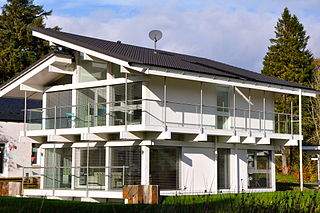
Huf HausGmbH & Co. KG is a German company operating worldwide and based in Hartenfels, Westerwald region, that manufactures prefabricated timber-framed houses. The houses combine modern glass facades with German Fachwerk ("half-timbered") design. Each building is individually designed. The homes, also called Huf houses, are available as zero-energy buildings.

The Renewable Energy Sources Act or EEG is a series of German laws that originally provided a feed-in tariff (FIT) scheme to encourage the generation of renewable electricity. The EEG 2014 specified the transition to an auction system for most technologies which has been finished with the current version EEG 2017.
Different methods of electricity generation can incur a variety of different costs, which can be divided into three general categories: 1) wholesale costs, or all costs paid by utilities associated with acquiring and distributing electricity to consumers, 2) retail costs paid by consumers, and 3) external costs, or externalities, imposed on society.
The European Solar Prizes are a series of awards which have been given annually since 1994 by the European Association for Renewable Energy (EUROSOLAR) located in Bonn, Germany. The prizes are awarded to individuals or organizations for outstanding contributions to the utilization and applications of renewable energy in all its available forms.
The Solarpark Alt Daber is a photovoltaic facility in Germany generating 67.8 megawatts. It was completed 3 December 2011, for a cost of €100 million, and is expected to produce 71 GWh/year. It is on a former military airport.
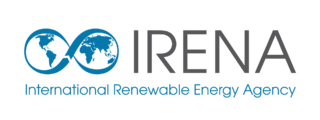
The International Renewable Energy Agency (IRENA) is an intergovernmental organization mandated to facilitate cooperation, advance knowledge, and promote the adoption and sustainable use of renewable energy. It is the first international organisation to focus exclusively on renewable energy, addressing needs in both industrialised and developing countries. It was founded in 2009 and its statute entered into force on 8 July 2010. The agency is headquartered in Masdar City, Abu Dhabi. The Director-General of IRENA is Francesco La Camera, a national of Italy. IRENA is an official United Nations observer.

Volker Quaschning is a German engineer and professor of renewable energy systems at the Hochschule für Technik und Wirtschaft Berlin, Germany.
Martin Kaltschmitt is a German engineer and professor at Hamburg University of Technology. He is head of the Institute of Environmental technology and Energy economics at Hamburg University of Technology.

Eveline Lemke is former German politician and member of the Alliance 90/The Greens. From 18 May 2011 until 18 May 2016, she was vice minister president of Rhineland-Palatinate and Minister for Economics, Climate Protection, Energy and Regional Planning. On 27 March 2011, she was elected into the Landtag of Rhineland-Palatinate. She was the leading candidate for her party in the 2016 Rhineland-Palatinate state elections along with The Greens faction leader in the Landtag, Daniel Köbler, after having been leader of the party since 2006. As vice minister Lemke represented the state of Rhineland-Palatinate in the German Bundesrat. As author and speaker in green technological issues and Circular Economy, she founded Thinking Circular in 2017. This thinktank is listed in the Sustainable Development Goals Help Desk, a platform by the United Nations since July 2018. She is also working as consultant together with Prof. Michael Braungart, chemist and inventor of the design philosophy Cradle-to-Cradle, Martin Lees and David Wortmann (DWR-Eco-Innovation-Alliance).
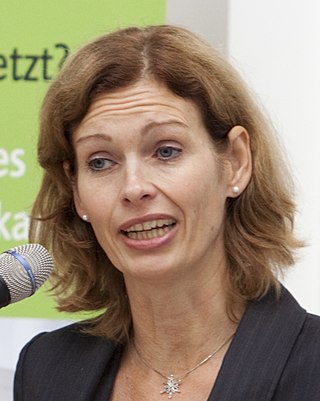
Susanne Nies is an energy and climate professional. She served in various roles across the industry and in think tanks. Positions include, from March 2020 to March 2023, as General Manager Germany DACH at Smart Wires.
Neela Winkelmann-Heyrovská is a Czech academic, environmental activist and government official. She was the founder and first managing director of the Platform of European Memory and Conscience, an educational project of the European Union bringing together government institutions and NGOs from countries of Europe and North America active in research, documentation, awareness raising and education about the crimes of totalitarian regimes, in 2011-2018.
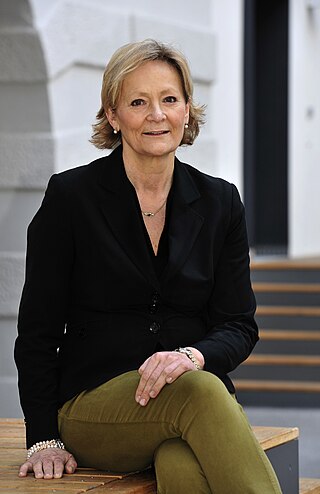
Barbara Koch is a Professor of Remote Sensing and Landscape Information Systems at the University of Freiburg, Germany. When she took this position, Koch became the youngest and first female professor at the Faculty of Forest Sciences at the Albert -Ludwigs University in Freiburg.

By the end of 2016 Austria already fulfilled their EU Renewables Directive goal for the year 2020. By 2016 renewable energies accounted to 33.5% of the final energy consumption in all sectors. The renewable energy sector is also accountable for hosting 41,591 jobs and creating a revenue of 7,219 million euros in 2016.















